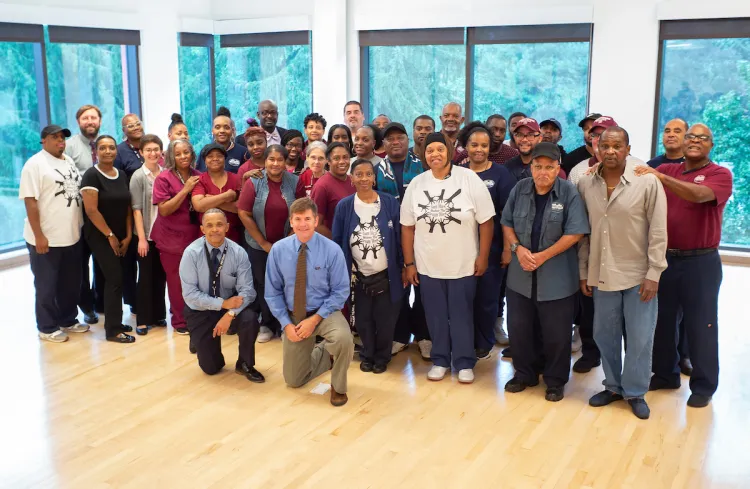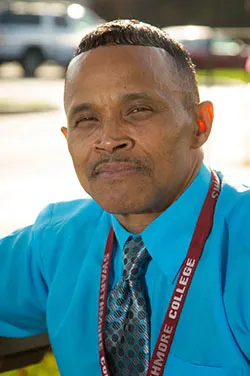Q&A with Environmental Services Director Tyrone Dunston

Members of the environmental services team recently gathered in the Matchbox during EVS Week. It's "a chance to honor the staff for the hard work they do throughout the year, and all the things they accomplished," says Dunston (front left).
When Tyrone Dunston was on the verge of becoming the director of environmental services (EVS) at Swarthmore in fall 2016, a colleague at Drexel University begged him to reconsider.
You’re going to be bored there, he said. Look at all the great things you’re doing here. You go to Swarthmore, you’re not going to know what to do with yourself.
But Dunston, a proud Marine, seized the opportunity. A few months later, he called the colleague back.

Tyrone Dunston
“I said, ‘I’m not bored,’” says Dunston, smiling widely. “‘Not by a long shot.’”
On the heels of EVS Week, which the College community celebrated with a gathering for EVS staff on the top floor of the Matchbox, Dunston took a moment to reflect on his eventful first two years at the College and to offer his admiration for his new colleagues. The conversation then shifted to the current priorities and vision for EVS and the College, namely the impacts of the Zero Waste initiative and a new tool could help the College achieve the top rating for cleanliness in higher education.
What stood out to you from EVS Week?
It was mainly a chance to honor the staff for the hard work they do throughout the year, all the things they accomplished. Showing appreciation not just from our leadership team but from the larger College community, as well. And as part of that, I’ve been asking questions about how else we can show appreciation throughout the year. One of the things I heard was there used to be a perfect attendance award here, and that people really liked it. They liked the precedent it set and how it gave them something to target. We kicked that off this year and had 22 employees out of 55 who had perfect attendance from July through September. So we announced [at the EVS Week gathering] that such quarterly recipients will have $10 added to their One Card and that one of them from each of the three zones on campus will get a $100 gift card at the end of the year. A little way of letting them know we appreciate them.
How has EVS taken to the College’s Zero Waste initiative?
The composting, in particular, was new to a lot of techs, but they’ve gotten the hang of it quickly and are now able to help guide students and other community members on what goes where—composting, recycling, or regular waste. They’ll see people standing by the three-tier [new bin design] trying to figure out what goes where, and they are more than happy to educate. Although education is continuous, they have become pretty knowledgeable on the process. We still have some work to do, educating ourselves on the waste flow of each particular building. But our staff members have taken ownership of the process and take pride in their individual areas, as well as the campus in whole. I’m very proud of them and what they do. We know change can be hard at times, but when you go in a new direction and you start to see it working, you start to embrace it, to own it.
How is the College going about raising its cleanliness rating?
We’ve been working for several months trying to implement an effective cleaning program called Smart Inspect. It involves daily inspections and data gathering but also allows us to pinpoint troubled areas and training opportunities. There are five levels of cleaning in higher education, measured according to APPA standards. We are a level 2 cleaning facility. With the new buildings we have coming our way, the remodels and updates, we wanted to keep the goals we set for ourselves achievable. But that being said, I always stress to my staff: overachieve, all of the time. And we want to be engaged with our clients—the faculty, staff, and students—to ask what we’re doing very well and what we can do better. Their feedback is very important to us.
What’s been your biggest takeaway from your first two years at Swarthmore?
One of the things that surprised me most is the involvement of the College community. I’ve learned Swarthmore likes to have meetings, it has a lot of committees, but they’re all for a purpose. Swarthmore strives to be one of the most sustainable and diverse colleges in the industry, and even globally. So for me the experience of people being so involved here and also of feeling like I have a voice that is heard on campus and in the committee meetings has been great. I was expecting it, but not to that level. I’d say Swarthmore stands in a small category of colleges where the energy level on sustainable processes is huge, and where people are very passionate about it. That’s not something I had ever experienced.



